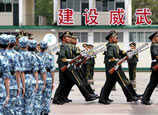
HOUSTON, July 18 (Xinhua) -- Cooperation and exchanges at the local level between China and the United States are blessed with opportunities and have a huge potential to tap, a senior Chinese diplomat said here.
In a recent exclusive interview with Xinhua, Chinese Consul General in Houston Xu Erwen said that the resource-rich southern U. S. states share good momentum in cooperation with China's provinces and cities, which is beneficial for both sides and will cement basis for a new type of major-country relationship.
Xu made an analogy with her area of jurisdiction which covers eight southern states including Texas, Oklahoma, Arkansas, Louisiana, Mississippi, Alabama, Georgia, Florida and U.S. territory Puerto Rico.
"If we compare the United States to a sandwich, the states along the east and west coasts are two slices of bread while the southern states are the fillings, the most nutritious part," she said.
With an increasing number of enterprises and population moving south in recent years, Xu observed, the importance of the southern states are just showing itself. States like Texas are among the least affected places amid the economic recession and large shale oil reserves gave another boost to the booming economy here, she said.
Cooperation and exchanges in various fields between the southern U.S. states and China have registered good results and keep expanding, Xu said. The trade volume between China and Xu's area of jurisdiction scored over 100 billion U.S. dollars last year, up 9.85 percent over the previous year, far above the national average 6.54 percent.
The southern U.S. states become the biggest destination of Chinese investment.
More than 80 percent of Chinese direct investment in the United States are in the southern states, Xu said. More than 100 Chinese enterprises have reached the southern states with a total investment of 8.5 billion dollars, creating thousands of job opportunities for locals.
The cooperation and exchanges maintain good momentum not only in economy and trade but also in politics, culture, and education, Xu said. High-level visits of governors and mayors to China have brought about more investment opportunities to the United States while pairs of friendly states, provinces and cities were set up to enhance people-to-people exchanges.
Last year, central China's Henan Province and Arkansas State were paired to forge a friendly relationship, while three such links have been established between cities, Xu said.
More than 50,000 Chinese students are now studying in the southern U.S. states while 19 Confucius institutes here are offering Chinese courses to Americans, she said.
Xu said she noticed in her contact with people from all walks of life that southern U.S. states are eager for greater cooperation with China and are offering favorable policies like tax cut to attract more Chinese investment.
The thriving energy sector in the southern states, boosted by discovery of shale oil reserves, and the Panama Canal expansion project, scheduled to be completed in 2015, mean tremendous opportunities for Chinese companies, Xu said.
The project will double the capacity of the canal and facilitate trade between the U.S. states along the Gulf of Mexico and China, she said, adding that many port expansion projects and channel dredging plans could bring a lot of business opportunities for Chinese companies.
Xu warned that protectionism is a major hurdle that hampers Chinese investment here. She urged the United States to ward off protectionism of all kinds so as to provide a just and sound environment for Chinese investors.
The U.S. part should recognize that Chinese investment here is not a zero-sum game but rather a mutually beneficial cooperation, she said.
The diplomat emphasized that cooperation between the United States and China, the world's two largest economies, is not only very important for themselves but also for the rest of the world.
She said that the consensus reached recently by Chinese President Xi Jinping and his U.S. counterpart Barack Obama on building a new pattern of major power relationship based on mutual trust and reciprocal cooperation charted a new course for future China-U.S. ties.
Xu stressed that as President Xi pointed out, the advancement of China-U.S. relations not only requires high-level efforts but also needs local cooperation and people-to-people exchanges. Cooperation and exchanges at the local level could cement the basis for bilateral ties at large and become a source of strength for further development.
"The potential of cooperation at the local level between the two countries is huge and is yet to be fully tapped. I believe that hard work from both sides will make more headway in this regard and help our bilateral cooperative partnership take a deeper root," she said.
















 116-year-old Chinese woman recognized as world's oldest
116-year-old Chinese woman recognized as world's oldest


![]()
